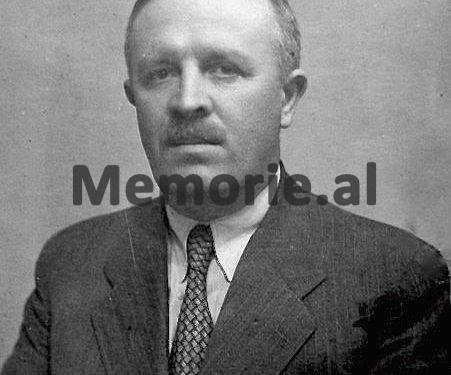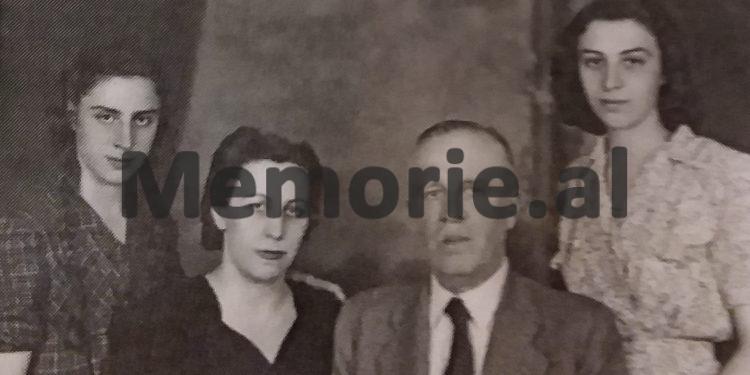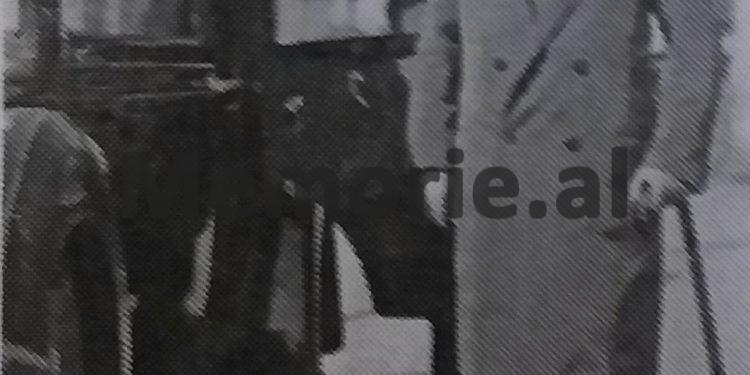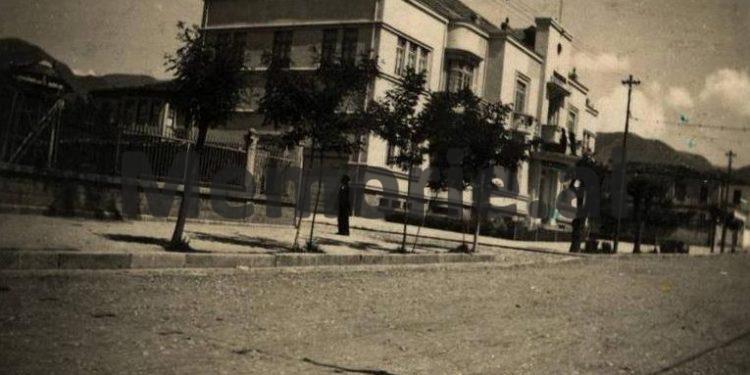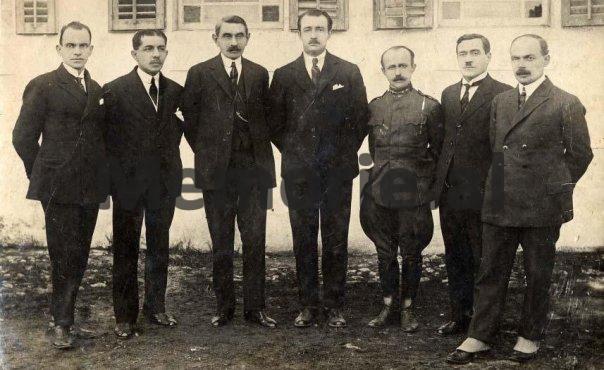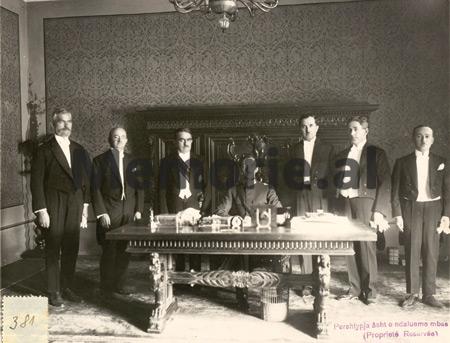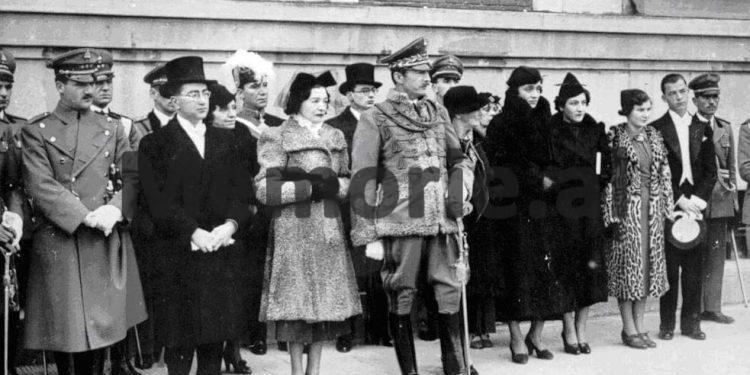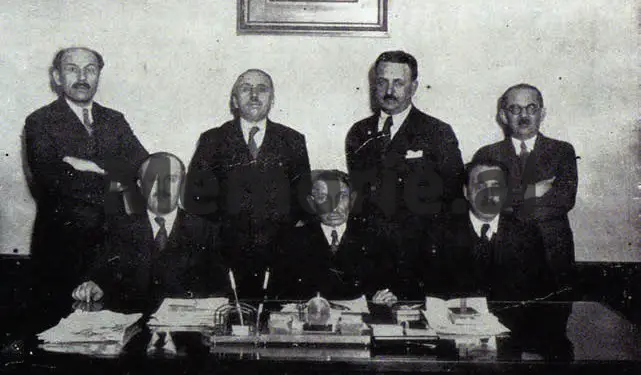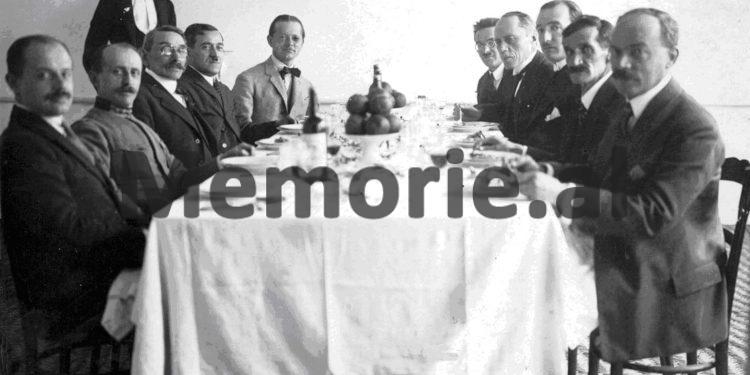Dashnor Kaloçi
Memorie.al publishes the unknown story of Vasil Avrami, originally from the city of Korça, where his father, Rafael, who was known as a great landowner, sent his son to study first in Athens and then in Istanbul, where he was graduated from the Faculty of Law with high results. After that, he returned to his hometown in Korça, where in the years 1917-1918, he served as the Mayor of the city and in 1925, he was elected member of the Albanian Parliament together with Pandeli Evangjeli and Koço Kota and until in 1939, he also held the post of Minister of Justice in several government cabinets. The whole story of Minister Avrami, from the refusal to participate in the delegation that sent to Rome the ‘Crown of Skanderbeg’ for King Victor Emmanuel III, to his refusal to accept the ‘offer’ of Xhaferr Deva, to take a post high in the Albanian government under German occupation and imprisonment by the communist regime and persecution of his family.
“After April 7, 1939, when fascist Italy carried out military aggression against Albania, my father Vasil Avrami resigned from the post of Minister of Justice that he had held for several years in the cabinet of Koço Kota, and returned to Korça expressing himself. that he did not intend to get involved in politics anymore. A few days later at our house near the Metropolis, some officials of that time came and told my father that he had been assigned to the delegation that would go to Italy to take the Crown of Skanderbeg to King Victor Emmanuel III. The father categorically refused and refused to do so. So, the Italians arrested him and after holding him for several days in Korça, they brought him to Tirana where he remained under house arrest “.
This is what Keti Avrami (Hobdari) testified in an exclusive interview for Memorie.al, regarding the story of her father Vasili, who after graduating from Jurisprudence in Istanbul, was elected Mayor of Korça, member of the Albanian Parliament of the period Monarchy and Minister of Justice in the government headed by the Prime Minister, Koço Kota. Regarding these and other facts from the life of former Minister Avrami, his daughter Keti testified to us, who together with her sister, Zhaneta, throughout the period of Enver Hoxha’s communist regime, until 1990, would suffer the savage class war.
MP and Minister of Justice
From 1925 until 1939, Vasil Avrami, served as a deputy of Korça in the Albanian parliament and was twice appointed by King Zog, to the post of Minister of Culture. Regarding this period of time, daughter Kathy testifies: “At the beginning of 1931, our father resigned from the post of Minister of Justice, a post he had taken two or three months ago. This happened after some heated debates that were made in parliament, where he opposed the passage of a law, which had to do with the possession of property.
From the approval of that law, some latifundists, such as Lalë Krosi, Maliq Beu from Korça, etc., unjustly benefited, for whom at that time they were said to have promoted that law as well. On the other hand, they lost a large number of poor farmers living in the villages of Korça and Pogradec, where Vasili was an MP. Although the father opposed the law to the end, it was approved by a majority of votes. Based on this, the father resigned and refused to stay as Minister of Justice. Although King Zog begged him, “Vasil, we are not here in England to resign for this reason.”
After resigning, the father came to Korça where he took care of the family property. But after a while, Zogu calls his father in Tirana where he tells him to accept his previous post again. The reason Zogu asked him for this task was for an event that took place in 1931, when my father was Minister of Justice. At the time, a German engineer had made a project for the Ministry of World Affairs and complained that he had not received payment for the work done. The father ordered a trial, and after the German engineer won his right, he wrote an article in the Neue Zeitung entitled “Albanian Justice”.
In that article, the engineer praised Albanian justice, saying that the Balkan countries should be taken as an example from Albania. This newspaper fell into the hands of King Zog and he thanked our father for the gesture he had made. While Zogu asked her to take back the post of Minister of Justice, Vasili said: “Your Majesty, we work for you and for the perfection of the Monarchy and democracy in Albania”, recalls Kathy Avramik, adding that her father stayed in politics until in 1939, when he finally left politics after the fascist occupation of the country, resigning from all the functions and posts he held.
Arrest by the Italians
Regarding Vasili’s activity, during the period of fascist occupation, Kathy recalled: “After resigning, my father came to Korça and started managing our family properties. In the first days of April 1939, some people came to our house. politicians of the time and told the father that he had been assigned to the delegation that would carry the Crown of Skanderbeg, King Victor Emmanuel III to Rome.The father categorically refused this mission and after that, he was arrested by the Italians, who held him in house arrest in Tirana.
After some time, the father stood guard at the door of the house, the Italians ordered his release and he returned to Korça. After the capitulation of Italy and the arrival of the Germans, Xhafer Deva comes to our house, together with a German officer, and they beg our father to take part in the government of the regency. But he calmly denied it, telling him he had given up politics. Following this fact, Xhaferri and the German officer began to put pressure on him, telling him that if he did not accept, they would deport the family to Poland. Then my father said to them, ‘Do whatever you want with me, but do not touch my family, for they have no responsibility for my decisions.’
Although Deva and the Nazi officer continued to put pressure on our family, no action was taken against us. “During the years of German occupation, my father did not get involved in politics, but continued to administer the properties that our family fed on,” recalled Kathy Avrami.
Arrest by the communists
Regarding Vasili’s activity after 1944, Kathy Avrami recalled: “Seeing that his father was immaculate in politics, the communists did not harass him at first, although they left him without a job. From 1945 to 1950, the father was taken While my sister Zhaneta and I came to Tirana, where we lived for rent in a small room on Luigj Gurakuqi Street, in March 1950, when my father had come in Tirana, to see us both, he was arrested by the State Security.
The father stayed with the investigator for a year and we did not know anything about him, as we thought he might have been shot, as in that period, there were also executions of intellectuals in what is known as the ‘Soviet embassy bombing’. At the beginning of a year, my father was released and, as he told us, he was not mistreated, but only put under psychological pressure. A few days after his release, Vasili was interned in the villages of Levan and Radostimë in Fier and then in Kuç in Vlora. In extremely difficult conditions in exile, in 1956, the father became seriously ill and was taken to the hospital in Vlora, where he remained paralyzed. When my father spent 5 years in exile, he was released and brought to our house in Tirana. “From that time until August 13, 1962, when he passed away, our mother, Dhimitra, did him all the favors,” recalled his daughter, Katie, about the suffering and persecution of her family. in the period of Enver Hoxha’s communist regime.
The unknown story of Vasil Avram, MP from Korça
Vasili was born in 1890, in the city of Korça, to a family of early civic origin. Their house was located on “Thimi Mitko” street near the Metropolis. His father’s name was Rafael Avrami, and he was known as a great landowner. Although Rafael did not interfere in politics, his influence was evident in Korça, which was also exploited by the politicians of the time. In his memoirs, Sejfi Vllamasi, among others, states that: “Themistokli Gëremenji, with his tactics could elect important people in the government council, such as Vasil Kondi, Dr. Noçka, Rafael Avrami, Vasillaq Singjelari, Thimi Cale, Jani Vangjeli, Qani Dishnica, etc.
Although Raphael did not have a high school education, he made sure that he could provide for his children. His two sons, Vasili and Sotiri, were educated in Law in Istanbul and Paris. Vasili, after finishing high school in Korça, went to Athens, where he graduated from the classical gymnasium with high results. As a result, he gained the right to study law in Istanbul, where he graduated in 1915. After that he returned to his hometown, where in the years 1917-1918, he served as Mayor of Korça. He held that post until 1924, when fanatical forces overthrew the government of Shefqet Vërlac.
After Zog returned to power in December 1924, Vasili, as his supporter, returned to Tirana, where he ran for MP in the 1925 elections, in the district of Korça, where his family enjoyed great influence. Vasili, won convincingly over his rivals and together with Pandeli Evangeli and Koço Kota, entered parliament. In the same year, he married Dhimitra Avramushi, who came from an immigrant family in Cairo, and from this marriage, two daughters, Kathy and Zhaneta, were born.
From 1925 until 1939, he was a member of the Albanian Parliament, holding the post of Minister of Justice twice, where he distinguished himself as an uncorrupted politician. With the fascist occupation of Albania, he resigned because he refused to go to the delegation that would hand over the Crown of Skanderbeg to King Victor Emmanuel III. Even during the German occupation, he remained neutral, not participating in the government of the regency. After the communists came to power, he was not initially harassed, but took over the management of his property. In 1950, he was arrested by the State Security and after being held for a year in the investigator, he was released in 1951. After that, he was interned for five years in the villages of Myzeqe and the district of Vlora, where due to bad conditions, he became seriously ill and paralyzed. After his release from exile, he was brought to Tirana, where his wife Dhimitra and two daughters served him with great devotion until he passed away on August 13, 1962. /Memorie.al




